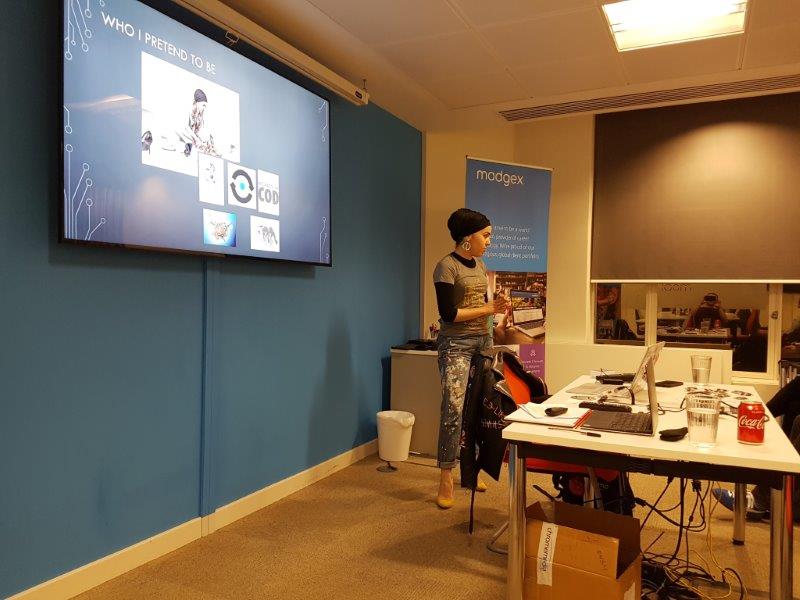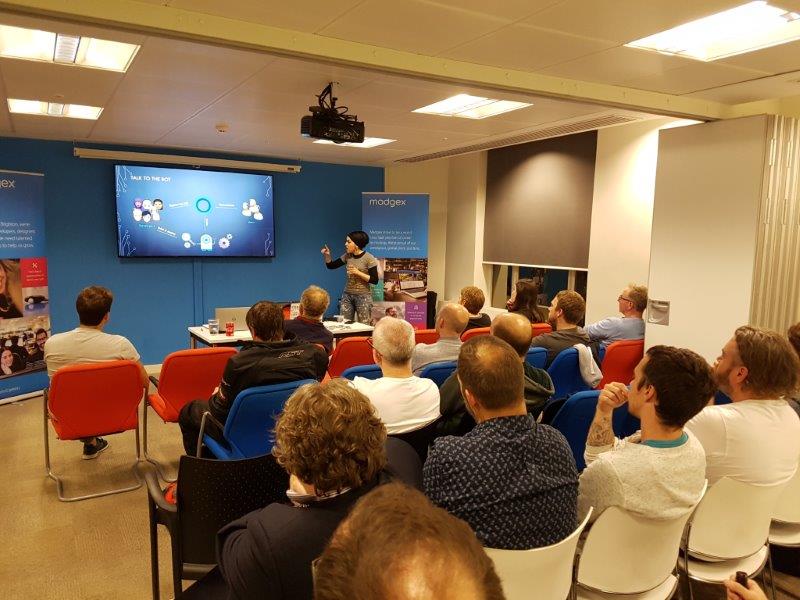Last night we held our third .NET South East meetup at Madgex HQ with special guest Rabeb Othmani. Here’s a brief summary of the evening…
Preparation
Planning for this meeting felt a lot easier than past events as I have built a few lists of things to do and have a bit of experience with setting everything up. As usual I did a bit of marketing for the event via Twitter, hoping to spread the word.
On the evening I finished work around 4:30pm to begin setting up the room and preparing things like the snacks and drinks. We have a pretty well-oiled process now and with the help of Ricky our IT guru we had the room prepared in about 30 minutes. The plan for the evening was to stick to the process we’d developed at our prior meetup.
We had our attendees sign in down in the foyer with two volunteers, Chris and Jenny very kindly helping to do that this month. Again we placed our food and drinks networking area in our main reception space so that there was more space for people to chat and socialise. Toby and Sally; two more Madgexians kindly helped meet and greet people from the lifts. This month I was please as everything was ready well in advance and I was actually able to spend a bit of time greeting and speaking to people as they arrived. This was something I’d been unable to do at the prior events where I was running around getting the final things sorted.
In the end we had 20 attendees for the evening so a bit of a drop off from our first two. I had kind of expected this since the novelty has worn off for some. We did have some new faces though so it was nice to see more members finding their way to us.
Intro and news
At 7pm I opened the evening with my introduction, including thanking our fantastic sponsors and then went on to discuss some of the news items I had gathered for this month…
Quantum Computing
The first item I discussed was taken from the Ignite 2017 announcement that Microsoft are expecting to release a Quantum computing programming language by the end of this year. Microsoft are heavily invested in research around building a working quantum computing device and would like to start skilling up developers to work in the quantum world. The new language is yet unnamed (my guest is Q#!) and will include full Visual Studio integration, including a debugging experience. A local simulator will be available to simulate a 30 Qubit device or an Azure based 40 Qubit similar can be used. It’ll be interesting to watch how this develops as quantum computing could truly change the way we think about programming.
Arstechnica Article on MS Quantum Computing
.NET 4.7.1 built in support for .NET Standard 2.0
A smaller news item but worth a quick mention, this story refers to the Microsoft announcement that 4.7.1 of the .NET Framework now includes all necessary files to consume .NET Standard 2.0 libraries. While 4.6.1 introduced compliance with the .NET Standard 2.0, it required some additional files to be deployed and in some cases binding redirects to be used.
.NET 4.7.1 built in support for .NET Standard 2.0 Announcement
UWP Supports .NET Standard 2.0
A related story was another Microsoft announcement that a major update for UWP means that it now supports .NET Standard 2.0. This introduces an additional ~20k APIs to the platform which developers can now take advantage of. It should also make sharing code between UWP and other platforms much easier. To use this update you need Visual Studio 15.4 and need to be targeting the Windows 10 Fall Creators Update.
UWP Supports .NET Standard 2.0 Announcement
Rabeb Othmani – Welcome to the age of conversational interfaces

Rabeb gave us a great talk that really set my mind off thinking about building bots! She talked about the coming of age of conversational interfaces via devices like Google Echo, Amazon Alexa and our smart phones.
She described the history of the changing development landscape as users move to consuming on smaller devices and via different interfaces. We moved from mouse on desktop devices, to touch on tablets and smart phones and we’re now entering the age of voice communication where we may never physically interact with the device at all.
Recent advances in technologies such as AI and machine learning are enabling us to develop more intelligent applications while improvements in voice recognition, language interpretation and text to speech have also driven the industry forward and moved us towards more and more voice based interfaces.
Digital assistants such as Google, Siri and Cortana understand more about the context in which we are operating and can tailor responses and information to our needs.
Voice as an interface is becoming popular in part due to its convenience and speed. With text we need to locate our device, unlock it, access an app, type data and wait for a response. With voice, we can very quickly interact without any need to physically hold the device. We can interact on the move or in situations such as in the car when our hands are not free to use a device. Voice can be very simple when done right as there are no UI issues in the traditional sense. However the application/device must be able to understand and interpret the intent of the user.
Rabeb listed some key point to consider when building voice based interfaces:
- Make it smart
- Use language users can understand
- The capabilities of your tech
- The structure of the info – For example dates; e.g. should you infer a year if the user doesn’t say one?
When building for devices like Alexa you build skills which are a unit of conversational intelligence. You must register the skill to be able to use it from your device. Skills invoke a bot in the cloud which does the processing for your application. Rabeb demoed the Microsoft bot SDK in Visual Studio and a simple bot which would call her phone using the Nexmo APIs.

It was a great introduction to the world of bots and voice interfaces. I have been inspired to add it to my list of things to try and I hope a few others will do the same. This is exactly why I believe user groups are so great. In a short evening you can quickly learn about a new technology with enough to get you excited and start you on a path of discovery. A big thank you to Rabeb for travelling down from Bristol to spend the evening with us.
As always, a big thanks too to the amazing volunteers from Madgex who helped me setup and run the evening and to all of the attendees for making time to join us. A final thanks goes to our sponsors for the evening who offered some great prizes and support of our user group.
Prize Draws
With the end of the evening closing in we drew the winners of the prizes from our fantastic sponsors for the event. The prizes we had to offer were:
JetBrains
One year individual subscription to any single JetBrains Toolbox product
Progress
DevCraft Complete License code
Manning
Free eBook
elmah.io
6 month Small Business license
PostSharp
License to PostSharp
Again we use the WPF app created by Dan Clarke, who organises the .NET Oxford meetup. The rules as with the last event were:
a) names are added from the RSVP list (as at about 1 hour before the event)
b) if the name drawn is not in attendance, we redraw.
Next events
We have some great speakers lined up for the next couple of months, and I’m working with a few people of plans for next year too.
.NET South East November 2017 – Michael Newton
Making Distributed Systems in .NET Easier
.NET South East November 2017 – David Arno
Roslyn Analysers
2018 events to be announced soon!
Call for speakers
I’d love to get a range of varied content and speakers to present at our user group. We have a nice pipeline for the coming months but those months will fly by very quickly. If you’d be interested in speaking at a future event we’d love to have you. Please get in touch via the contact form on this blog or ping me on Twitter and we can discuss availability and topics.
I’m really keen to draw as many speakers from our local community too so please let me know if you might be interested in speaking. Perhaps you have presented a talk internally and could open it up to a wider audience. I highly recommend speaking as a way to develop professionally. I’m happy to offer advice for new speakers and help where I can.
If you don’t like the idea of public speaking, you are not alone. Please check out my own story in my recent two part blog series – Part 1 of How to not hate public speaking.
Links
https://www.nexmo.com
https://rabebdiaries.wordpress.com/
https://dev.botframework.com
https://developer.microsoft.com/en-us/cortana
Have you enjoyed this post and found it useful? If so, please consider supporting me:
